What is BrowserScan? Check Fingerprints, IP Leaks & Stay Private
Take a Quick Look
BrowserScan helps users test fingerprints, IP leaks, internet speed, and ports. Learn how it works, its pros and cons, and how to stay private online with AdsPower.
Websites, advertisers, and platforms have become experts at identifying users online. Even if you change your IP with a proxy or VPN, your browser leaves behind a unique "fingerprint" that can still expose your identity. This fingerprint is made up of dozens of data points—like fonts, screen resolution, WebGL rendering, and time zones—that create a near-unique profile of your device.
That's exactly where BrowserScan comes into play. It's a testing tool designed to reveal whether your IP address is leaking and how identifiable your browser fingerprint really is.
In this article, we'll break down what BrowserScan is, how it works, and why terms like browserscan IP are important for anyone who cares about privacy or multi-account management. You'll also learn step-by-step how to use BrowserScan effectively, its limitations, and how it compares with other fingerprinting tools.
👉 By the end, you'll know not just how to test your setup with BrowserScan but also how to act on the results to strengthen your online privacy.
What is BrowserScan?
At its core, BrowserScan is a browser fingerprinting and IP leak detection tool. It doesn't anonymize you on its own—instead, it acts as a diagnostic platform. Its purpose is to show what information your browser and network are exposing whenever you visit a website.
When you run a BrowserScan test, the platform checks:
- Browser attributes such as user agent, installed fonts, screen resolution, and operating system.
- Rendering technologies like WebGL and canvas fingerprinting generate unique patterns.
- Audio and font identifiers that differ across systems.
- IP address data—what the outside world sees when you connect.
Put simply, it helps answer the question: How trackable am I?
Many people searching "What is BrowserScan?" are looking for a straightforward explanation of how it works and how to interpret results. Others search "browserscan ip" because they want to check if their proxy or VPN is leaking their real location.
BrowserScan shines by giving users clarity. Instead of guessing, you get a clear snapshot of your anonymity status.
How Does BrowserScan Work?
BrowserScan works by running a series of tests inside your browser and your network connection.
Here's what it analyzes:
1. Browser Fingerprint– Details such as fonts, screen resolution, time zone, language, WebGL rendering, canvas output, and audio context.
2. IP & Network Data – It checks your IP, ISP, DNS resolvers, and whether your VPN or proxy is leaking.
3. Targeted Fingerprint Checks – Instead of scanning everything, you can choose to test just one item like canvas fingerprinting or WebRTC leaks.
4. Internet Speed Test – Measures your download/upload speeds and latency.
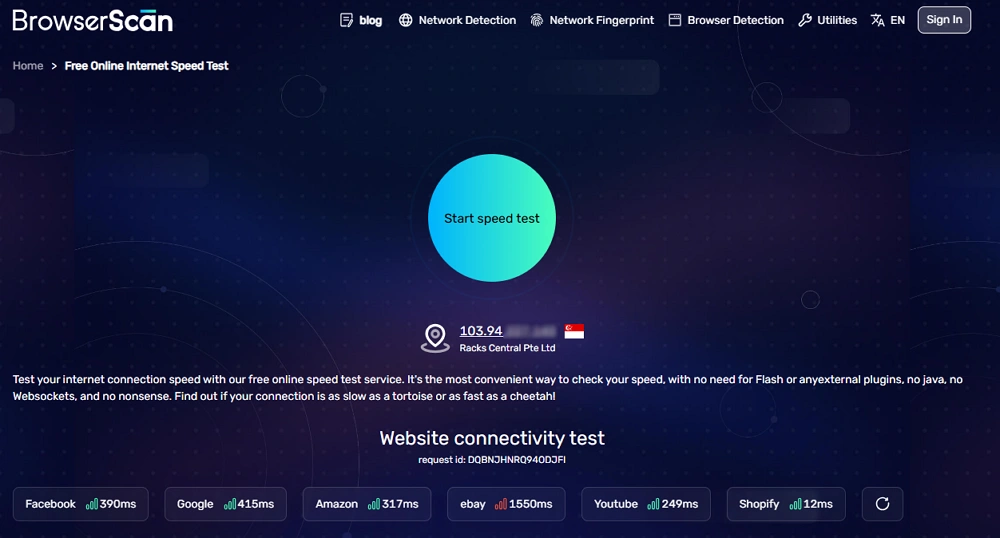
5. Online Port Scanner – Examines if any of your device's ports are open, which could be a security risk.
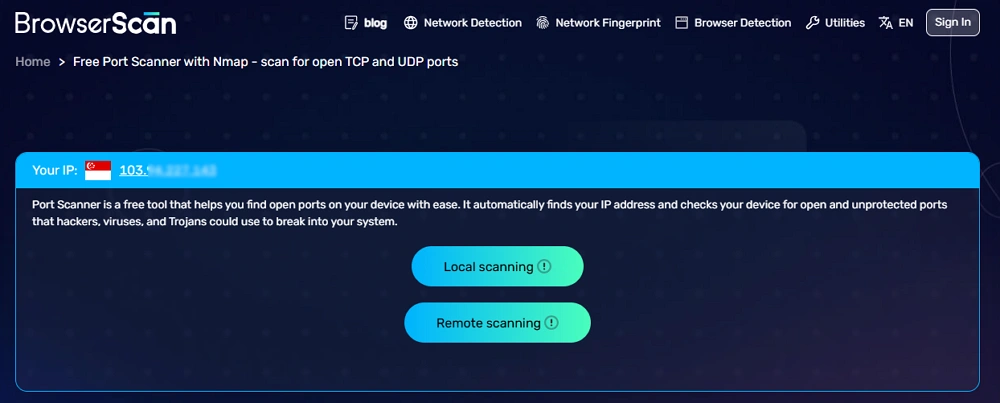
By showing this information in real time, BrowserScan lets you see what a website, tracker, or even an ad network could know about you.
👉 Actionable Advice: After testing on BrowserScan, you can reduce your fingerprint uniqueness by using tools like AdsPower, which lets you adjust key fingerprint signals such as fonts, WebRTC, and timezone settings.
Why People Use BrowserScan (and Who Should Care)
BrowserScan isn't just for cybersecurity professionals. A wide range of users benefit from it:
- Privacy-conscious individuals – See what personal data leaks during normal browsing.
- Affiliate marketers & media buyers – Ensure proxies and antidetect browsers (e.g.: AdsPower) mask their fingerprints effectively.
- Web developers & researchers – Test how consistent or unique their browser environment appears.
- Businesses managing multiple accounts – Check whether account setups look natural or suspicious.
- General users – Run a speed test or port scan to troubleshoot internet issues.
Simply put: if you value privacy, security, or performance, BrowserScan is worth checking.
How to Use BrowserScan Effectively (Step-by-Step Guide)
Here's how to get the most out of BrowserScan:
1. Go to the BrowserScan website.
2. Automatically run a full fingerprint scan. This shows all identifiers your browser reveals. The general fingerprint status and authenticity percentage are displayed after a while.
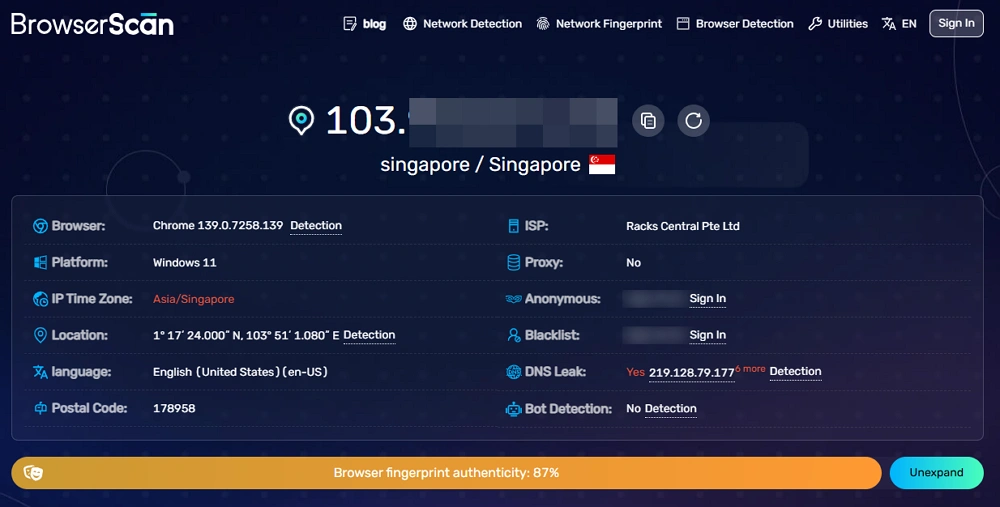
3. Scroll down to view specific items. All detailed info can be viewed. If you you tend to check some attribute separately, you can click the corresponding tools to move on.
For example, run only a WebRTC leak test if you want to verify your VPN's protection.
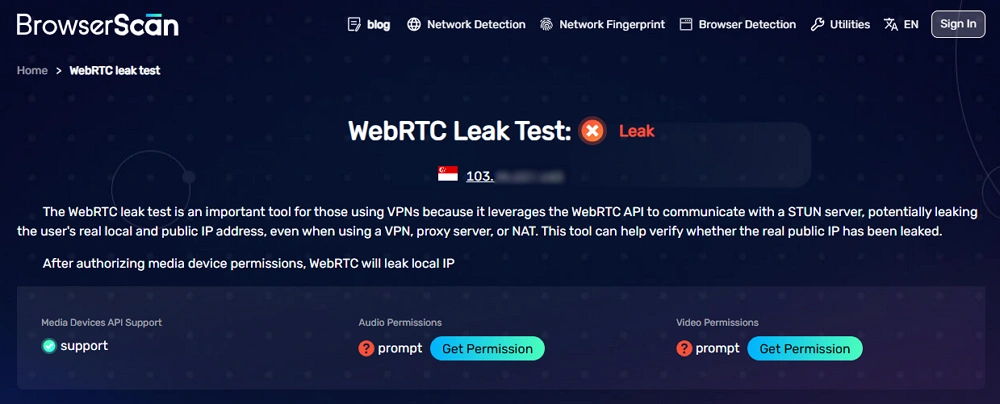
4. Adjust your setup. If BrowserScan shows a unique fingerprint, use tools like AdsPower browser to randomize parameters and reduce trackability.
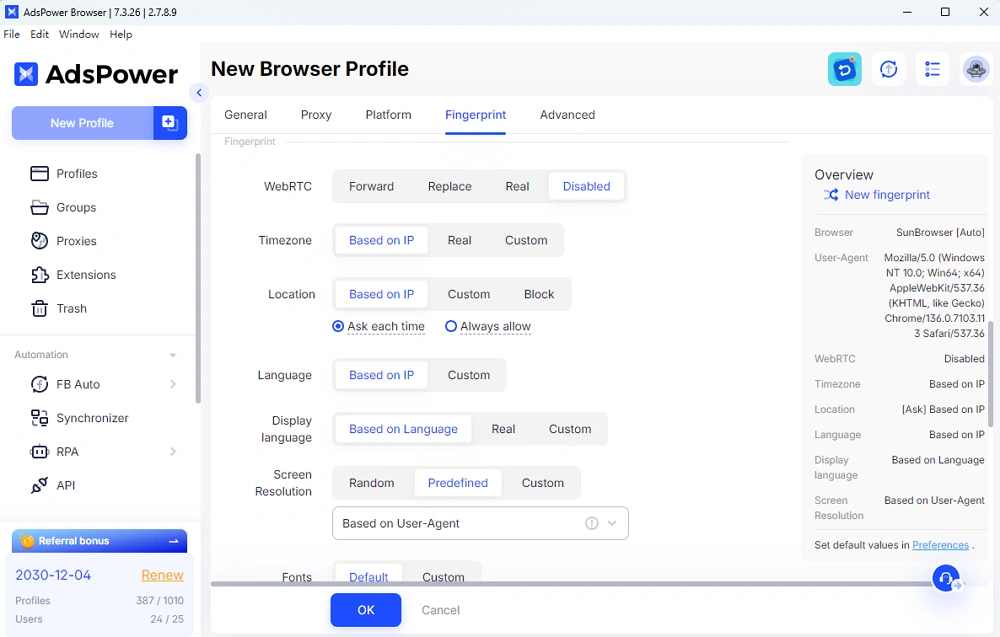
5. Re-check. Open BrowserScan in the AdsPower profile to re-test the adjusted fingerprint.
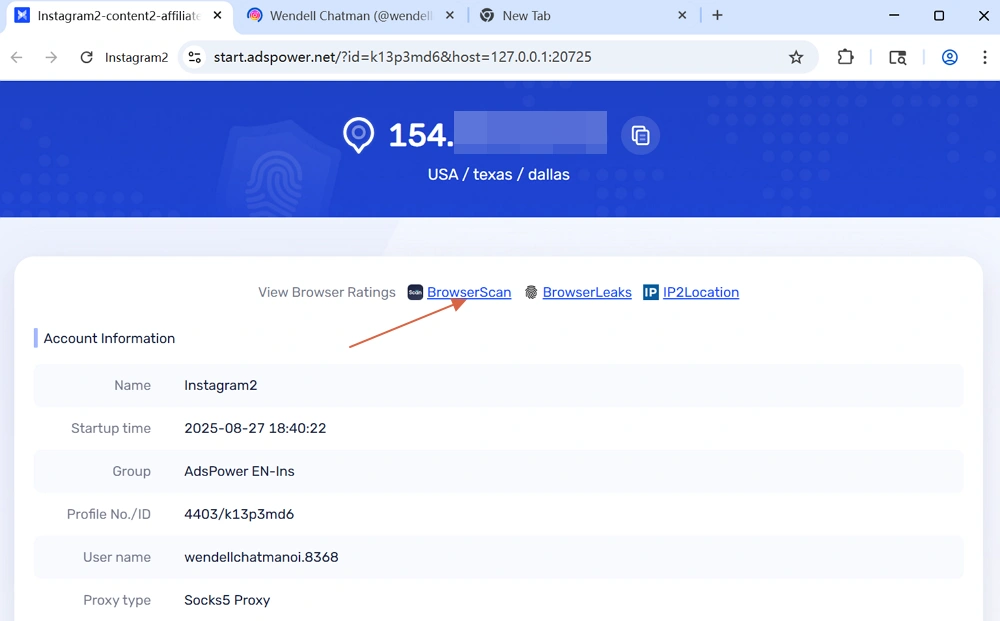
Limitations of BrowserScan
While powerful, BrowserScan has some limitations:
- It analyzes visibility, but doesn't directly protect you. You still need VPNs, proxies, or antidetect browsers for privacy.
- Some fingerprinting methods evolve faster than detection tools. A low similarity ratio today might change tomorrow.
- Speed tests may vary depending on server location and current traffic.
- Port scanning results depend on your firewall/router setup—always double-check with security software.
Think of BrowserScan as a diagnostic tool, not a security solution by itself.
BrowserScan vs Other Fingerprinting Tools
How does BrowserScan compare to similar services?
- AmIUnique – Focuses on fingerprint uniqueness but lacks IP leak or speed test tools.
- Pixelscan– Strong fingerprint analysis, but no port scanner.
- BrowserLeaks – Offers technical details but has a less user-friendly interface.
- BrowserScan – Combines all-in-one testing (fingerprints, IP, speed, ports), plus the ability to check individual fingerprint items, making it more versatile with score.
For those managing multiple accounts or proxies, BrowserScan is particularly useful when paired with tools like AdsPower Antidetect Browser, which lets you adjust or randomize the very parameters BrowserScan analyzes.
Final Thoughts
BrowserScan gives you an unfiltered look at what your browser and network reveal online. Whether you're checking for IP leaks, unique fingerprints, internet speed, or open ports, this tool is a must-have for anyone serious about privacy or security.
It doesn't replace VPNs, proxies, or antidetect browsers—but it shows you how well those tools are working. By pairing BrowserScan's insights with AdsPower's fingerprint management, you can stay a step ahead of tracking and account bans.

People Also Read
- Top Tools to Prevent Account Bans by Ensuring Consistent Browser Environments (2026 Guide)
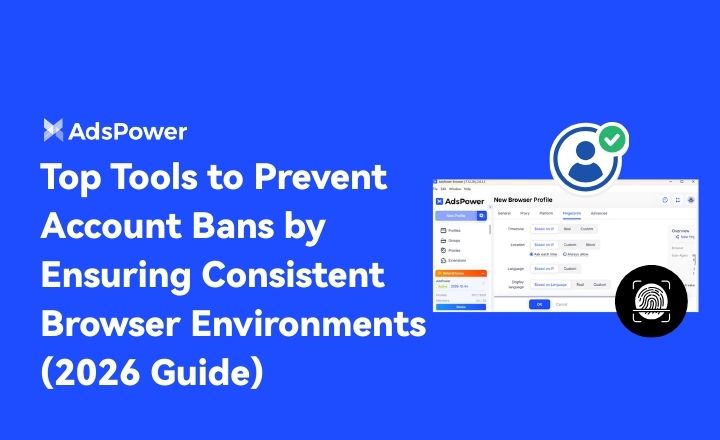
Top Tools to Prevent Account Bans by Ensuring Consistent Browser Environments (2026 Guide)
If you are looking for the best tool for preventing account bans with consistent browser environments, don't miss such a practical guide
- Browser Consistency & Kernel Mismatch: Why Accounts Get Banned (2026)
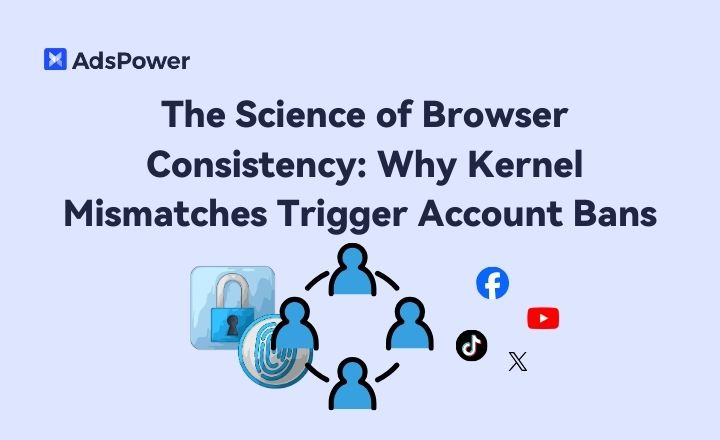
Browser Consistency & Kernel Mismatch: Why Accounts Get Banned (2026)
Avoid bans caused by fingerprint mismatches. Learn how AdsPower syncs browser cores, TLS, Canvas, and WebGL signals for consistent profiles in 2026.
- How Browser Fingerprinting Triggers Account Locks (And How AdsPower Prevents Them)
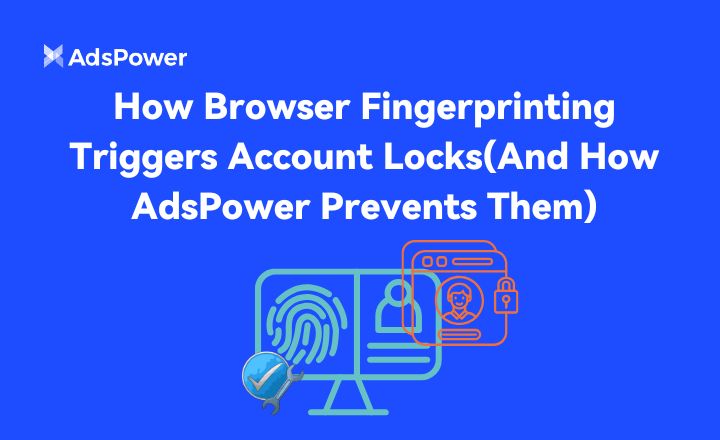
How Browser Fingerprinting Triggers Account Locks (And How AdsPower Prevents Them)
How browser fingerprint mismatches cause account locks & how AdsPower's dual-engine architecture with real browser cores & Native Mobile Simulation pr
- 8 Best Whoer Alternatives in 2026 ( Accurate & Private IP Check Tools)

8 Best Whoer Alternatives in 2026 ( Accurate & Private IP Check Tools)
Looking for a Whoer.net alternative? Discover our 2026 list of the 8 best IP check tools for accurate, private fingerprint analysis and enhanced onlin
- What Is WebRTC Used For? Does WebRTC Leak Your IP Address?
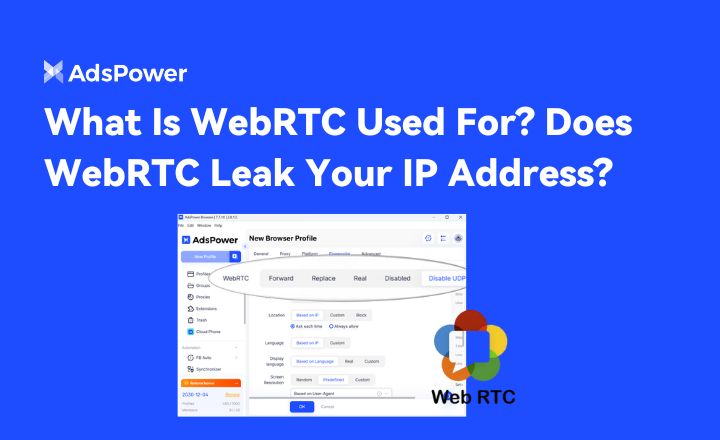
What Is WebRTC Used For? Does WebRTC Leak Your IP Address?
Learn what WebRTC is, what it's used for, whether it leaks your IP address, and how to stay protected with tools like AdsPower's WebRTC modes.


